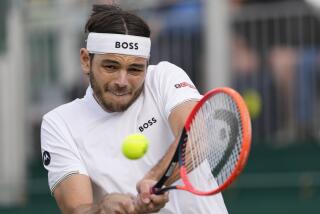Tab Hunted
- Share via
LAS VEGAS — There was a passing of the torch in men’s tennis last week that went virtually unnoticed in those parts of the world outside of Great Britain, and outside of the households of veteran Tim Henman and newcomer Andy Murray.
With his advance into the quarterfinals of the men’s ATP event at Memphis, Murray became No. 42 in the world, pushing Henman out of the spot as the highest-ranked men’s British player for the first time since Nov. 8, 1999.
Very possibly, when Henman heard the news, he found a quiet place to hide and weep.
Tears of joy.
In tennis, it certainly is not easy being No. 1. Even more difficult might be being No. 1 among the British.
Your worth is measured in the press by how you perform at Wimbledon and how you perform everywhere else to get ready for Wimbledon.
Once the last week in June arrives, you are not only scrutinized by the regular British tennis writers, who travel a lot and are skillful, knowledgeable and sharp of wit, but by a legion of additional local pundits, who excel at finding big headlines in small issues.
“Not a smart thing to make some wisecrack about Tony Blair the week before Wimbledon,” said Murray, already a veteran of tabloid assault and battery.
Murray is 18 and, as British No. 1, is the target in the crosshairs now.
He has moved up in the rankings nearly 375 spots in 16 months. He got a wild-card entry into Wimbledon last year, as would a promising young player from Dunblane, Scotland. And he made the most of it, getting to the third round and taking former Wimbledon finalist David Nalbandian of Argentina to a fifth set before losing.
Significantly, that was one round further than Henman, now 31 and a four-time semifinalist there. That was certainly not lost on the British press. Nor, later, was the fact that a struggling Henman, about to end a year out of the top 20 for the first time since 1996, had lost his last match of the season in October in Switzerland in a third-set tiebreaker.
To Andy Murray.
But the real validation, which can quickly lead to a coronation in the British press, took place two weeks ago in San Jose, where Murray not only won the title and the $52,000 purse, but beat Andy Roddick in the semifinals and Lleyton Hewitt in the final. Roddick was No. 3 at the time, Hewitt No. 11.
“That was all a bit of a shock,” Murray said. “With Roddick, I had never beaten a top-10 player. And then to have Hewitt in the final and to get through. ...”
After the victory in San Jose, the ATP put Murray on a conference call. On the other end of the line were 17 reporters from Great Britain. Seven showed up for his next stop in Memphis, where he lost in the quarterfinals, and six continued the trip here to the Tennis Channel Open, where he lost in the first round.
Next week, he will play in the Pacific Life Open in Indian Wells, a Tennis Masters Series event that is just a notch below the four Grand Slams in importance. It will be his first time there, the first time he had a ranking anywhere near high enough to get into the main draw. And it will be the first time that the British press will be fixated on somebody other than Henman and Greg Rusedski.
“I’ve spoken to Tim about how to deal with the press, and he has been very helpful,” Murray said. “He said it is an individual thing, that he can’t tell me which way to go, other than to just be myself and be straight with them.
“It is best not to put on any fake smiles, and you need to watch out for the little jokes. You say something and you think they got it and then you see it in a big headline.”
Murray said he was taken aback after Wimbledon last year. He thought his victory over No. 13 Radek Stepanek of the Czech Republic in the second round, and his five-set effort against Nalbandian, would be taken well.
“The press was pretty negative,” he said. “It wasn’t the regular writers, but the ones doing later wrap-ups. I had stopped the match in the first set against Nalbandian to see a physio [trainer] and they criticized me for that. They said I didn’t work hard enough, and practice hard enough, and that was coming from people who had never come out to watch me practice.
“I think it is pretty obvious that you can’t get into the top 100 in the world without practicing hard.”
There could be relief ahead for Murray. Henman is only a few spots behind him in the rankings and a good run at Indian Wells, where Henman has played well several times, could shift the limelight back to the veteran.
Or, Murray could continue to dabble in the occasional sacrilege of freely admitting his affection for the slow clay courts of the French Open and even that he thinks his best chance for an eventual Grand Slam tournament title is not Wimbledon, but the U.S. Open, where medium hard courts suit his game.
No grass? No great expectations at Wimbledon? No chance of Henman Hill becoming Murray Mountain?
No way the British press would like that.
More to Read
Go beyond the scoreboard
Get the latest on L.A.'s teams in the daily Sports Report newsletter.
You may occasionally receive promotional content from the Los Angeles Times.











